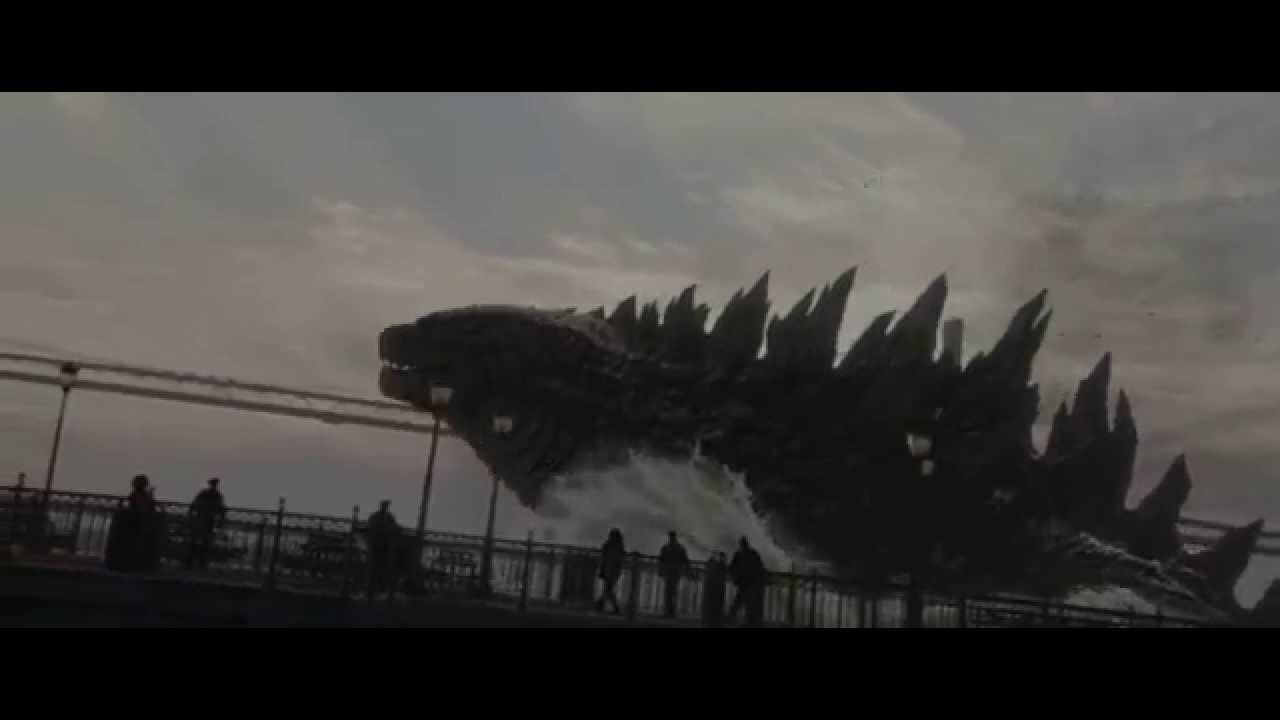
Godzilla (2014; Gareth Edwards)
GRADE: C-
By Mike Dub
There is an interesting idea buried in the mediocrity of the latest revamp of Godzilla, directed by soon-to-be kazillionaire Gareth Edwards. Throughout the first three-quarters of the 123-minute film, Edwards teases his audience with momentary glimpses of the epic battle between the title character and its enemy, known as Muto. These brief sightings mostly get shown through news coverage that appears on the televisions of characters who have too much on their mind to take notice of what would be the most prolonged and widespread event of destruction the United States has ever witnessed. The battle takes place for much of the film, but it isn’t until the last twenty minutes or so that the film finally allows us the pleasure of seeing giant monsters fight each other, which is, you might assume, the reason we’re watching the movie in the first place.
The concept of playing with the audience’s perspective, denying their expectations, could have come across as witty and possibly even subversive, if – and this is a very important “if” – we had even the remotest chance of caring about what is happening on the screen instead. Here, rather than showcasing the only thing Hollywood seems to be capable of doing well in the last decade, generating awe-inspiring special effects for pure visceral pleasure, we are given the agonizingly vapid story of Ford Brody (Aaron Taylor-Johnson): American soldier, father, and son of one of those crackpot scientists that always seem to be in charge of nuclear facilities.
 Good-looking in the blandest way possible, the kind of handsome that can make a teenage girl swoon without upsetting her father, Taylor-Johnson’s performance is remarkable for his ability keep his voice on the same two notes for an hour and a half of screen time. Of course, that’s all that the one-dimensional script and the CGI-centric direction require of Taylor-Johnson.
Good-looking in the blandest way possible, the kind of handsome that can make a teenage girl swoon without upsetting her father, Taylor-Johnson’s performance is remarkable for his ability keep his voice on the same two notes for an hour and a half of screen time. Of course, that’s all that the one-dimensional script and the CGI-centric direction require of Taylor-Johnson.
Evoking the worst of Spielberg, Edwards ushers Brody through one vacuous manipulation after another. Brody, a soldier returning from combat duty, must confront the death of his mother fifteen years ago in a nuclear accident, exonerate his “crazy” dad, save a small Japanese boy’s life and cart him around for a while, and diffuse an actual ticking timebomb. Instead of mindlessly ripping off the most superficial aspects of Spielberg in a mendacious homage, perhaps Edwards and his studio could have been inspired by the best of Spielberg’s material. For example, characters who are more than just obsessives with father issues, heroism that means more than just saving a cute foreign kid, and the unabashed joy of a spectacular action sequence.
By investing so much of the film’s time in reiterating tired tropes that signal only the most basic ideas of heroism, patriotism, and family, Godzilla embraces the seemingly ubiquitous hypocrisy of modern blockbuster “popcorn” movies. Terrified of being thought of as mindless or crude for exploiting the audience’s desire to see cool shit on a big screen, Hollywood studios cynically jam into their movies the sorts of stories and themes that prove themselves infinitely more mindless and base than the self-loathing image they are trying to conceal.
There is no harm in being honest about what people want to see. When Brody reunites with his wife after a disaster, the 300 people I saw the movie with were dead silent. But when Godzilla kicked that other thing’s ass, they cheered like they were at a playoff game.
Categories: e street film society, Reviews

